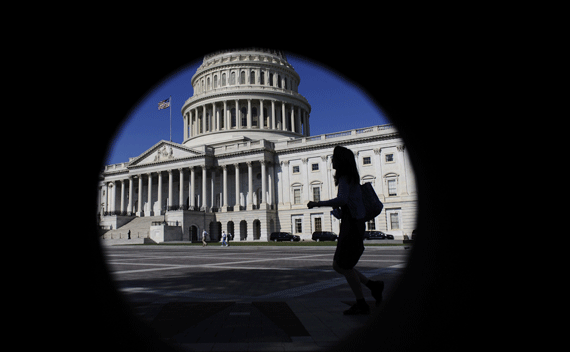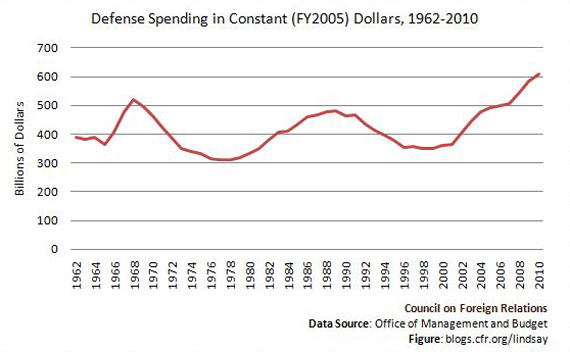Friday File: Debt Debate—The Sequel
More on:

Above the Fold. Circle November 23 on your calendar. That’s the deadline for Congress’s new special bipartisan joint committee to put forward a plan to cut $1.5 trillion in federal spending over the next decade. The committee, whose members will be announced on August 16, may generate its own deficit reduction plan. Or the White House and congressional leaders may spend the next three months brokering a deal for the committee to propose. Either way it is reasonable to wonder why an extra three months and a new legislative vehicle would make Democrats and Republicans any more likely to compromise on the issues that divide them. The argument for thinking they will be is that a failure to strike a deal—and to enact it into law by December 23—will trigger sequestration—across-the-board cuts that will be distributed evenly between domestic and national security spending. Perhaps the presumed GOP desire to protect defense spending and the presumed Democratic willingness to put it at risk will force an agreement. But that calculation ignores the fact that if sequestration is triggered the budget axe won’t actually fall for another year—until January 2, 2013 to be exact. So each party knows that a failure to strike a deal this November gives them all of 2012, which happens to be an election year, to accuse the other side of intransigence and irresponsibility. That also leaves plenty of time for Congress to come up with a more sensible package of budget cuts. Congress tends not to act until it has to act, so don’t be surprised if Washington’s deadlock over fiscal policy continues well into 2012.
CFR Event of the Week. The tenth anniversary of 9/11 is fast approaching. To mark the occasion, CFR is posting a series of short videos with my colleagues offering their assessments of the consequences of the attack and America’s response. Ed Husain argues that the United States and its allies still have much work to do to undermine the ideologies that led to 9/11. Foreign Affairs editor Gideon Rose argues that 9/11 gave the executive branch a “blank check” to act overseas in a way that would have been unimaginable a decade earlier. Isobel Coleman credits the tragedy with sparking a more open debate in the Arab world about the roots and nature of radicalization—a debate that in some ways led to the Arab Spring. Elliott Abrams recounts his experience as a member of the White House staff on 9/11 and discusses the creation of the Bush Freedom Agenda as a response to the attack. CFR will be releasing more videos over the next several weeks.
Read of the Week. The New Yorker’s Nicholas Schmidle tells the inside story of Navy SEAL Team 6’s killing of “Crankshaft”—Osama bin Laden. What Schmidle failed to note in his gripping account is that he didn’t talk to any of the twenty-three Navy SEALs who helicoptered into Abbottabad on May 1st, an oversight that has sparked some outraged responses in the blogosphere as well as some reasoned defenses. Schmidle’s reporting is instead based on conversations with people (presumably in the military) who spoke to the SEALs.
Blog Post of the Week. The debt ceiling agreement has spurred warnings that our new “age of austerity” imperils U.S. national security. Defense Secretary Leon Panetta has warned that any cuts that go beyond the $350 billion over ten years already specified in the debt ceiling deal “would be completely unacceptable” and could do “real damage.” My colleague Max Boot shares that fear, arguing that any additional cuts could hasten America’s decline as a world power. Against this backdrop of gloom, Slate’s Fred Kaplan offers some compelling reasons to think that defense spending can be reduced without harming national security, if policymakers are willing to set priorities and make tough choices.
Poll Question of the Week. Do Americans like the deal to raise the debt ceiling? Apparently not. Gallup found that Americans are more likely to oppose (46 percent) than favor (39 percent) it. Majorities of Democrats support the deal (58 percent), while majorities of Republicans (64 percent) and Independents (50 percent) oppose it. Opposition to the debt ceiling agreement is highest among people Tea Party supporters (68 percent). Unfortunately, Gallup did not structure its poll to identify why people opposed the deal. Gallup speculates that opposition is “most probably” rooted in “the fact that the debt ceiling was raised without an immediate and offsetting reduction in federal spending.” Other plausible and by no means contradictory explanations include doubts that the deal went far enough to rein in federal spending, partisanship (among Republicans at least), and the deal’s failure to raise taxes (among Democrats).
Chart of the Week. Whether to cut defense spending and by how much is be one of the big questions that the new congressional bipartisan joint committee will be tackling. So how does defense spending today compare historically? The chart below, which looks at defense spending in constant, or inflation-adjusted, dollars, provides an answer. Defense spending is higher today than it was during the era of the Reagan defense build-up. It is also higher than it was at the peak of the Vietnam War. A point to note: this chart includes spending on the wars in Iraq and Afghanistan. Looking just at what DoD calls the “base budget”—that is, excluding the direct costs of Iraq and Afghanistan—would put current spending roughly on par with spending levels in the mid-1980s. Whether that is too much, too little, or just right turns largely on assessments of whether the world is more dangerous now than it was then.
Too Good Not to Note. Elliott Abrams reflects on whether justice is being done at Hosni Mubarak’s trial. Adam Segal unpacks “Operation Shady Rat,” a long-running cyber-hacking operation that appears to have been run out of China. Isobel Coleman looks at VisionSpring, an innovative effort to improve economic productivity in the developing world by getting simple reading glasses to the poor. Micah Zenko surveys the tangled politics surrounding the Iraqi government’s possible request that U.S. troops stay in Iraq beyond the December 31 deadline. Jake Grover explains why famine is gripping the Horn of Africa even though USAID saw it coming and began preparing for it. David Axe reports on China’s efforts to build a fleet of small warships. Josh Rogin looks at eight foreign policy fights that are looming on Capitol Hill. Ezra Klein says don’t fear the bond vigilantes, fear the growth vigilantes.
Perils of Prediction. “Having already set the stage for an upset, Republicans in Nevada will oust Democrat and Senate powerbroker Harry Reid.” Newsweek. “Our Political Predictions for 2010.” Senator Reid defeated his opponent Sharron Angle by 40,000 votes, kept his job as Senate Majority Leader, and helped broker the deal to raise the debt ceiling.
Quote to Ponder. “Wise men speak because they have something to say; Fools because they have to say something.” Plato.
A Reason to Smile. Stars in summer sky.
More on:
 Online Store
Online Store
